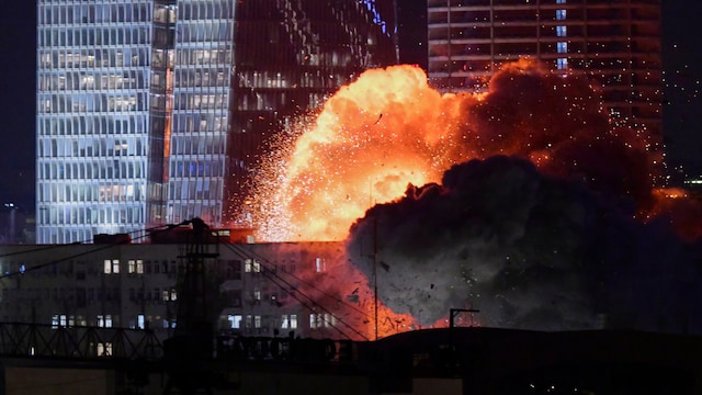
Iran Threatens U.S. Bases Over Israel Conflict
Iran vows retaliation and targets U.S. bases amid intensifying conflict with Israel, raising regional and global alarm.
Rising Tensions After Israeli Strike on Tehran
Iran launched a wave of missile attacks on Tel Aviv following a series of Israeli strikes on Tehran aimed at disabling its nuclear capabilities. In response, Tel Aviv residents were ordered to remain in shelters as Israeli forces intercepted the missiles late Friday evening.
Amid the escalating violence, U.S. officials are evaluating whether American involvement is inevitable. Although Secretary of State Marco Rubio initially claimed the U.S. was not involved, President Donald Trump suggested he supported Israel’s actions. Iran, in turn, accused the U.S. of complicity, warning that the aggression could not have occurred without American coordination.
President Trump ordered a partial evacuation of the U.S. embassy in Iraq and allowed military dependents to leave various Middle Eastern locations. “We got to tell them to get out because something could happen soon,” Trump said, underscoring concerns over regional escalation.
Iran Signals U.S. Military Targets
Iranian Defense Minister Aziz Nasirzadeh threatened that U.S. bases in the region are within reach. “If a conflict is imposed on us… we will boldly target them in host countries,” he declared. Iran has missiles and drones capable of reaching U.S. facilities in Iraq, Syria, and the Gulf. These threats come just days before planned nuclear negotiations between Washington and Tehran in Oman.
Experts note that Iran has previously attacked U.S. bases, including a ballistic missile strike in 2020 following the killing of Qasem Soleimani. “It is possible, and it’s not theoretical,” said one analyst. “The regime has done this in the past and lived to tell the tale.”
Currently, the U.S. maintains at least 19 military sites in the region, including eight permanent bases in countries such as Iraq, Bahrain, and Qatar. About 40,000 American troops are stationed across the Middle East, many within direct range of Iranian forces.
Defense analysts warn of Iran’s ability to operate through proxies and potential sleeper agents inside the U.S. “Iran has demonstrated… that it has the capability to establish infrastructure here in the United States,” said one security expert, citing Hezbollah and other networks.
Another major concern is Iran’s ballistic missile arsenal, which reportedly includes more missiles than the U.S. has interceptors worldwide. Some U.S. bases, particularly in Iraq and Syria, are considered vulnerable due to limited air defense systems.
Rosemary Kelanic, a Middle East policy expert, said the emotional toll on Iranian leadership cannot be underestimated. “You're talking about human beings who just watched their country get attacked,” she said. “That’s a tough thing for Iran to actually muster to do, but that’s clearly the right move for them strategically.”
Despite fiery rhetoric, some analysts believe Iran may prefer to avoid directly provoking the U.S., instead focusing on Israel. “At this point, I don't think Iran wants to provoke the U.S.,” said one regional researcher. Still, he cautioned, “The longer this conflict drags on, it’s very likely the U.S. military will get more involved.”
Ayatollah Ali Khamenei vowed Israel “will not escape unscathed” and pledged to bring it “to its knees.” The U.S. previously coordinated with Israel to repel Iranian responses in April and October last year. Analysts now fear Israel’s latest actions could spiral into a broader regional war involving American forces.
“I think this is a huge strategic mistake by Israel,” said Kelanic. “I’m worried they’re going to drag the United States into this giant mess.”






